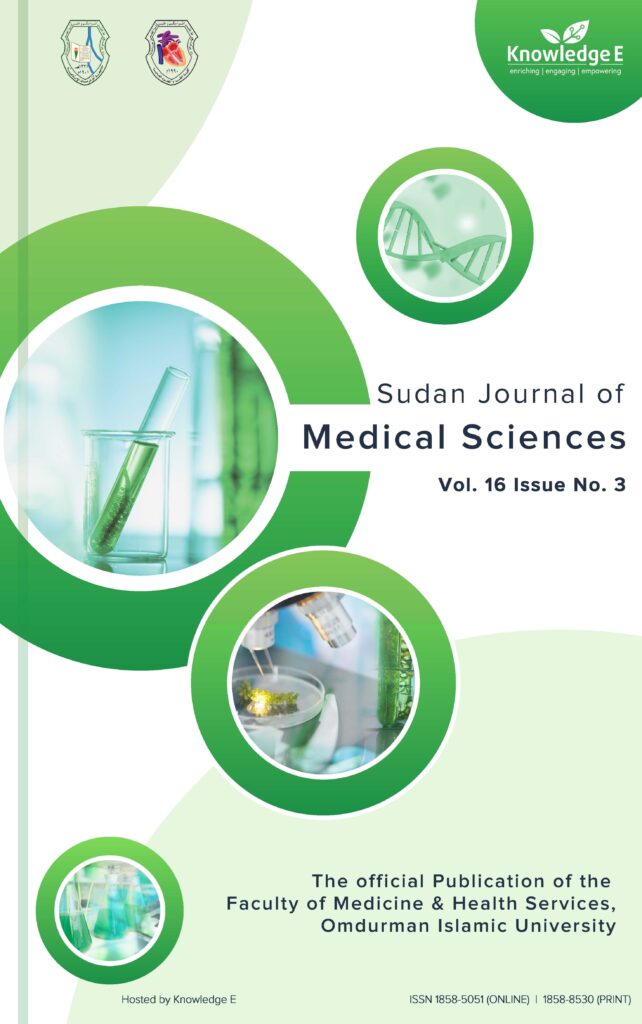
Sudan Journal of Medical Sciences
ISSN: 1858-5051
High-impact research on the latest developments in medicine and healthcare across MENA and Africa
The Cross-talk Relationship between Metformin and Gut Microbiota
Published date:Dec 31 2020
Journal Title: Sudan Journal of Medical Sciences
Issue title: Sudan JMS: Volume 15 (2020), Issue No. 4
Pages:425 – 430
Authors:
Abstract:
Background: Metformin is the first-line oral therapy for type 2 diabetes mellitus. However, its mode of action is poorly defined. There is an increasing awareness regarding the cross talk of gut microbiota and metformin. The current review aimed to assess the bidirectional relationship between metformin and gut microbiota. Methods: Electronic search was conducted in Pub Med and the first 100 articles in Google Scholar published until November 2019. However, only randomized controlled trials on humans published in the English language were included. The terms “gut microbiota,” “gut flora "and “ metformin” were as keywords to perform the search. Although 124 articles were retrieved, only six met the inclusion criteria of the study. Results: Of the six full texts of randomized controlled trials included in the study, two-thirds were published in Europe, one in the USA, and one in China. Six hundred-thirty five patients were included and the duration of the studies ranged from seven days to six months. The studies concluded that microbiota modulates some metformin actions on plasma glucose; while metformin enhances the abundance of microbiota that positively affect insulin resistance and plasma glucose. Conclusion: The current review showed that microbiota dysbiosis may mediate metformin antidiabetic effects. Whereas metformin shifted the gut microbiota toward the beneficial species ameliorating insulin resistance. The present study might provide insights into a novel therapeutic approach to treat type 2 diabetes mellitus.
Key words: gut microbiota, metformin, type 2 diabetes
References:
[1] Hostalek, U., Gwilt, M., and Hildemann, S. (2015). Therapeutic use of metformin in prediabetes and diabetes prevention. Drugs, vol. 75, no. 10, pp. 1071–1094. doi:10.1007/s40265-015-0416-8
[2] Sansome, D. J., Xie, C., Veedfald, S., et al. (2019). Mechanism of glucose lowering by metformin in type 2 diabetes: role of bile acids. Diabetes, Obesity and Metabolism, vol. 22, no. 2, pp. 141–148. doi:10.1111/dom.13869
[3] Foretz, M., Guigas, B., and Viollet, B. (2019). Understanding the glucoregulatory mechanisms of metformin in type 2 diabetes mellitus. Nature Reviews Endocrinology, vol. 15, no. 10, pp. 569–589. doi:10.1038/s41574-019-0242-2
[4] Mangiola, F., Ianiro, G., Franceschi, F., et al. (2016). Gut microbiota in autism and mood disorders. World Journal of Gastroenterology, vol. 22, no. 1, pp. 361–368. doi:10.3748/wjg.v22.i1.361
[5] Wu, B., Chen, M., Gao, Y., et al. (2019). In vivo pharmacodynamic and pharmacokinetic effects of metformin mediated by the gut microbiota in rats. Life Sciences, vol. 226, pp. 185–192. doi:10.1016/j.lfs.2019.04.009
[6] Caesar, R. (2019). Pharmacologic and nonpharmacologic therapies for the gut microbiota in type 2 diabetes. Canadian Journal of Diabetes, vol. 43, no. 3, pp. 224–231. doi:10.1016/j.jcjd.2019.01.007
[7] Barengolts, E., Green, S. J., Eisenberg, Y., et al. (2018). Gut microbiota varies by opioid use, circulating leptin and oxytocin in African American men with diabetes and high burden of chronic disease. PLOS ONE, vol. 13, no. 3, p. e0194171. doi:10.1371/journal.pone.0194171
[8] Napolitano, A., Miller, S., Nicholls, A. W., et al. (2014). Novel gut-based pharmacology of metformin in patients with type 2 diabetes mellitus. PLOS ONE, vol. 9, no. 7, p. e100778. doi:10.1371/journal.pone.0100778
[9] Burton, J. H., Johnson, M., Johnson, J., et al. (2015). Addition of a gastrointestinal microbiome modulator to metformin improves metformin tolerance and fasting glucose levels. Journal of Diabetes Science and Technology, vol. 9, no. 4, pp. 808–814. doi:10.1177/1932296815577425
[10] Pedersen, C., Gallagher, E., Horton, F., et al. (2016). Host-microbiome interactions in human type 2 diabetes following prebiotic fiber (galactooligosaccharides) intake. British Journal of Nutrition, vol. 116, no. 11, pp. 1869–1877. doi:10.1017/S0007114516004086
[11] Wu, H., Esteve, E., Tremaroli, V., et al. (2017). Metformin alters the gut microbiome of individuals with treatment-naive type 2 diabetes, contributing to the therapeutic effects of the drug. Nature Medicine, vol. 23, no. 7, pp. 850–858. doi:10.1038/nm.4345
[12] Bordalo Tonucci, L., Dos Santos, K. M., De Luces Fortes Ferreira, C. L., et al. (2017). Gut microbiota and probiotics: focus on diabetes mellitus. Critical Reviews in Food Science and Nutrition, vol. 57, no. 11, pp. 2296–2309. doi:10.1080/10408398.2014.934438
[13] Sanctuary, M. R., Kain, J. N., Chen, S. Y., et al. (2019). Pilot study of probiotic/colostrum supplementation on gut function in children with autism and gastrointestinal symptoms. PLOS ONE, vol. 14, no. 1, p. e0210064. doi:10.1371/journal.pone.0210064
[14] Paramsothy, S., Nielsen, S., Kamm, M. A., et al. (2019). Specific bacteria and metabolites associated with response to fecal microbiota transplantation in patients with ulcerative colitis. Gastroenterology, vol. 156, no. 5, pp. 1440–1454.e2. doi:10.1053/j.gastro.2018.12.001
[15] Elbere, I., Kalnina, I., Silamikelis, I., et al. (2018). Association of metformin administration with gut microbiome dysbiosis in healthy volunteers. PLOS ONE, vol. 13, no. 9, p. e0204317. doi:10.1371/journal.pone.0204317
[16] Tong, X., Xu, J., Lian, F., et al. (2018). Structural alteration of gut microbiota during the amelioration of human type 2 diabetes with hyperlipidemia by metformin and a traditional Chinese herbal formula: a multicenter, randomized, open label clinical trial. MBio, vol. 9, no. 3, pii: e02392-17. doi:10.1128/mBio.02392-17